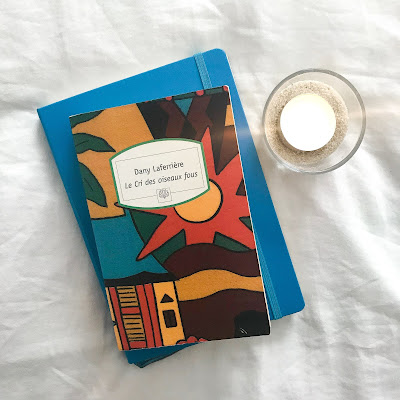This autobiographical novel was first introduced to me in my final year of my Bachelors (2014) in one of my French modules; it was one of the primary texts and one of the first full-length novels in French I was to read. I really enjoyed reading it at the time, and even revising the text during exam season! So I decided to re-read the novel to begin reading more in French again and to see how my relationship with the text has developed. I am writing this review in English for fellow French-reading anglophones, though there is a French version too.
My edition was published by Le Serpent à Plumes in 2002, though it was originally published by Lanctot Éditeur in 2000. Dany Laferrière's 346-paged novel is divided into short time-stamped chapters during the course of 24 hours, which are the last 24 hours the author experiences in his homeland Haiti before being exiled indefinitely. It is written with a first-person narrative, following the protagonist's thoughts where he offers a very personal perception of people, things and events. I will explore some of the key themes and reflections in the book alongside my own reading experience.
Vieux Os (Old Bones), La Ferrière's pseudonym, is driven to exile following the unprecedented assassination of his close friend Gasner. This assassination sets the scene of 1976 politics in Haiti, a country living under the harsh dictatorship of Baby Doc (Jean-Claude Duvalier) which is in itself a legacy of Papa Doc (Francois Duvalier). Therefore this a highly political novel, as we learn much about the culture and lifestyle this dictatorship creates. Vieux Os compares the two dictatorships with the latter seemingly even more corrupt than the former, yet both with their own approach to brutality and control. Such torture and suffering is no doubt feared yet there are notions of whether it is better to be tortured by your own (Haitian government) or by others, referring to suffering at the hands of white people in foreign countries or even during the period of enslavement. Does it matter who is subjecting you to mistreatment?
Gasner's assassination raises many reflections on the nature of friendship and various types of friendships that Vieux Os holds close to his heart. We learn the secret "codes" they hold between themselves as well as the rarity of good, safe friendships in a world ridden with spies, traitors and "tonton macoutes", the dictatorship's police force. Since friendship is the catalyst for exile in many ways, it cannot go without analysis in our very contemplative protagonist's mind.
As we learn about Haiti's culture through our protagonist, we are soon exposed to its unique religious environment where two dominant religions reside: Catholicism and Vaudou (or Vodou). This religious dichotomy not only represents ancient practises versus colonial teachings, it also shows different approaches to faith and seeking strength and hope in the tense environment. Laferrière does not shy away from intertwining Vaudou gods or beliefs in his writing, even in subtle ways when recalling his deceased friend thus engaging the reader with the religion.
Women play an important role in Haiti and in Vieux Os' last day in the country. We are introduced to many different types of women, from the saintly, grief-stricken mothers to vulgar temptresses and many somewhere on the spectrum between those extremes. Thus Laferrière explores lust and temptation as well as love and commitment. We learn how women are integral to keeping homes and the country running, as men are so often being persecuted. Laferrière shines a light on the strength of womanhood in such extreme conditions.
The novel also delves into the world of prostitution, a strategic industry nurtured by the dictatorship to contribute to weakening the population. Moreover, prostitutes have access to a world of deep, dark secrets and are thus valuable sources. In some ways we see the human side of such a vulnerable and potentially brutal career.
Overall, I found it a pleasure to read this autobiographical novel. Laferrière explores a vast range of themes connected to his life and nation from family and friendship to life and death. Because this novel is based on the author's real life experiences and many of the characters are presumed to be real to some capacity or another, I was left with the desire to know more about what happened to the author himself and his parents- which would mean I need to look for the corresponding books in his long series. I enjoyed the writing style as I found it amusing in places, which balanced out some of the sorrow
***
Have you read this novel? What did you think of it? Comment your thoughts below, I'd love to hear what you thought.
***
Follow me on instagram @nafisasiddique for updates on my latest posts.

